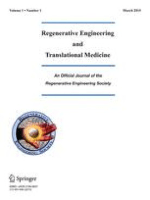
Current Stem Cell Reports
Scope & Guideline
Exploring the Future of Cell and Developmental Biology
Introduction
Aims and Scopes
- Stem Cell Therapeutics:
The journal emphasizes research on various therapeutic applications of stem cells, including their use in treating conditions like liver disease, congenital disorders, and orthopedic issues. - Characterization and Dynamics of Stem Cells:
A core area of focus is the characterization of stem cells, particularly rare populations like hematopoietic stem cells, and understanding their dynamics through mathematical modeling. - Innovative Delivery Methods:
Research on novel delivery systems for stem cells and gene therapies is highlighted, showcasing advancements in prenatal and particle-based delivery techniques. - Immunomodulation and Transplantation:
The journal covers the immunomodulatory properties of stem cells and strategies to overcome immune barriers in transplantation, which are critical for the success of stem cell therapies. - Emerging Technologies and Methodologies:
Current Stem Cell Reports also emphasizes the integration of cutting-edge technologies such as machine learning and bioreactor systems in stem cell research and therapeutic applications.
Trending and Emerging
- Prenatal and Fetal Therapies:
An increasing focus on prenatal therapies for congenital conditions demonstrates the journal's commitment to addressing early interventions and maternal health. - Machine Learning and Computational Modeling:
The rise of machine learning applications in stem cell research indicates a growing interest in data-driven approaches to understand stem cell behavior and optimize therapies. - 3D and Nano-engineered Scaffolds:
Research on the use of advanced scaffolding techniques for enhancing stem cell applications in regenerative medicine shows a trend towards improving therapeutic outcomes through engineering. - COVID-19 Related Stem Cell Applications:
The impact of COVID-19 has led to an uptick in research exploring stem cell therapies for associated conditions, highlighting the journal's responsiveness to global health challenges. - Ethical Considerations in Stem Cell Research:
There is a notable increase in discussions around the ethical frameworks guiding stem cell research, especially concerning fetal therapies, reflecting a broader societal concern.
Declining or Waning
- Focus on Traditional Stem Cell Sources:
There has been a noticeable decline in studies focusing on traditional sources of stem cells, such as embryonic stem cells, as newer sources and methods gain traction. - Basic Biology Studies:
Research centered around the fundamental biology of stem cells, such as basic differentiation pathways, seems to be waning in favor of more applied and clinical research. - Regulatory Framework Discussions:
Papers discussing regulatory frameworks for stem cell therapies have decreased, possibly reflecting a shift towards more practical applications and experimental studies.
Similar Journals

Stem Cell Reviews and Reports
Exploring the Future of Regenerative MedicineStem Cell Reviews and Reports is a prestigious journal published by SPRINGER specializing in the dynamic field of stem cell research, encompassing various aspects of cell biology and cancer research. With an ISSN of 2629-3269 and E-ISSN of 2629-3277, this journal serves as an essential resource for academics, offering insightful reviews and cutting-edge reports from 2009 to 2024. The journal has achieved a commendable Q2 ranking in both Cancer Research and Cell Biology categories as of 2023, highlighting its significant contribution to the scientific community. Additionally, with Scopus rankings placing it in the 74th percentile for both biochemistry and cell biology, it is recognized for its high-quality articles that foster innovative approaches in stem cell therapy and regenerative medicine. As an Open Access publication, Stem Cell Reviews and Reports ensures that its comprehensive content is readily available to researchers, professionals, and students, promoting collaboration and advancement in this vital area of study.

Stem Cell Research
Pioneering research for a healthier tomorrow.Stem Cell Research is a premier Open Access journal published by ELSEVIER, dedicated to advancing the understanding of stem cell biology. Since its inception in 2007, the journal has provided a platform for the latest research in the fields of Cell Biology, Developmental Biology, and Medicine, with its publication being accessible globally since 2014. Located in the Netherlands, the journal’s comprehensive scope aims to bridge fundamental discoveries with clinical applications, fostering collaboration among researchers and professionals. With a 2023 impact factor reflected in its Q4 ranking in Cell and Developmental Biology and a commendable position in the 64th percentile for General Medicine, Stem Cell Research remains a vital resource for those interested in the dynamic landscape of regenerative medicine. Targeting an audience that includes researchers, practitioners, and students, the journal emphasizes not only the significance of stem cells in medical science but also the ethical considerations and the public discourse surrounding stem cell research. Join the community committed to pioneering the future of stem cell science through rigorous peer-reviewed research.

Stem Cells International
Empowering Knowledge in Regenerative BiologyStem Cells International is a premier open access journal published by HINDAWI LTD, focusing on the rapidly evolving field of stem cell research. With an ISSN of 1687-966X and E-ISSN 1687-9678, this journal has been a vital resource since its inception in 2010, showcasing innovative studies and breakthroughs up to 2024. Positioned in Q3 in Cell Biology and Q2 in Molecular Biology for 2023, as well as well-ranked in the Scopus database, the journal serves as an essential platform for researchers, professionals, and students dedicated to exploring the implications of stem cell technology in regenerative medicine and biological research. The open access model ensures wide accessibility, fostering collaboration and knowledge-sharing across the scientific community, making it a cornerstone in advancing the understanding and application of stem cell science.

Cell Journal
Fostering Global Collaboration in Cell ResearchCell Journal is a leading interdisciplinary publication in the fields of Cell Biology, Developmental Biology, Molecular Biology, and Reproductive Medicine, published by ROYAN INST since its inception as an open-access journal in 2007. With an ISSN of 2228-5806 for print and 2228-5814 for electronic editions, it provides a vital platform for researchers and professionals to disseminate innovative findings and insights that shape our understanding of cellular processes and reproductive sciences. The journal boasts an impressive Scopus ranking, achieving a Q3 position in both Molecular Biology and Reproductive Medicine, highlighting its significance in the academic community. Situated in Tehran, Iran, Cell Journal encourages global collaboration through its accessible content, making cutting-edge research available to a diverse audience. As it converges from 2011 to 2024, the journal continues to emphasize the importance of thorough scientific inquiry, fostering advancements that drive both theoretical frameworks and practical applications in cell science.

American Journal of Stem Cells
Unveiling the potential of stem cells for next-generation therapies.American Journal of Stem Cells is a leading multidisciplinary publication dedicated to advancing the field of regenerative medicine and stem cell research. Published by E-CENTURY PUBLISHING CORP, this journal has gained recognition for its commitment to high-quality scientific contributions, achieving impressive rankings within the Scopus database, particularly in the areas of Biochemistry, Genetics and Molecular Biology, and Developmental Biology. With its focus on innovative research, the journal offers crucial insights and developments that appeal to researchers, professionals, and students alike. Although it is not an open-access journal, the American Journal of Stem Cells plays a pivotal role in disseminating impactful findings that define the future of cellular therapies and regenerative methodologies. The journal's past coverage from 2012 to 2017 reflects its dedication to advancing knowledge in key scientific disciplines, making it an essential resource for anyone engaged in the dynamic landscape of stem cell science.

Regenerative Engineering and Translational Medicine
Unveiling New Horizons in Cell Biology and EngineeringRegenerative Engineering and Translational Medicine is an esteemed academic journal published by Springer Heidelberg, focusing on the interdisciplinary fields of biomaterials, biomedical engineering, and cell biology. With an ISSN of 2364-4133 and an E-ISSN of 2364-4141, the journal has carved a niche for itself since its inception in 2015, showcasing cutting-edge research that bridges the gap between scientific findings and practical applications in regenerative medicine. As a recognized platform in its field, it is currently positioned within Q3 quartiles in biomaterials, biomedical engineering, and medicine (miscellaneous), with a Scopus ranking that reflects its growing influence among peers. The journal aims to disseminate high-quality, peer-reviewed articles that highlight advancements in regenerative engineering, further advancing both theoretical and applied research. Scholars and practitioners seeking to stay at the forefront of the ever-evolving landscape of regenerative health solutions will find invaluable insights and innovations within these pages. Join a community of leading thinkers and explore the journal's comprehensive research contributions, which are crucial for fostering partnerships between academia and industry in the quest for transformative medical solutions.

Current Stem Cell Research & Therapy
Elevating the Science of Stem Cells for Better HealthCurrent Stem Cell Research & Therapy, published by Bentham Science Publishers Ltd, is a leading journal dedicated to advancing the field of stem cell research. With an ISSN of 1574-888X and an E-ISSN of 2212-3946, this journal has been a valuable resource since its inception in 2006 and continues to broaden its scope through 2024. Recognized in the Q2 quartile for Medicine (miscellaneous) and ranked in the 66th percentile among its peers, the journal plays a crucial role in disseminating high-quality, peer-reviewed research that explores both the therapeutic and biological implications of stem cells. Located in the United Arab Emirates, Current Stem Cell Research & Therapy embraces a global audience of researchers, professionals, and students, providing a vibrant platform for discourse and innovation. While the journal offers subscription-based access, it remains committed to enhancing the scientific community's understanding of stem cell therapy and its applications across various medical fields.

Journal of Tissue Engineering and Regenerative Medicine
Empowering researchers with impactful insights in tissue engineering.Journal of Tissue Engineering and Regenerative Medicine, published by WILEY, stands as a pivotal platform in the fields of biomaterials, biomedical engineering, and regenerative medicine. With an ISSN of 1932-6254 and an E-ISSN of 1932-7005, this journal, based in the United Kingdom, has consistently delivered high-quality research since its inception in 2006, converging critical insights through 2024. With an impressive citation profile reflected in its Scopus rankings—specifically a rank of #58 in Medicine and #75 in Biomedical Engineering—the journal is acknowledged for its substantial impact, as demonstrated by its competitive quartile standings in 2023. Notably, it maintains a Q3 ranking in Biomaterials and Q2 in both Biomedical Engineering and Medicine (miscellaneous), showcasing its influence and relevance in the rapidly evolving interplay between engineering and medicine. The journal serves as a vital resource for researchers and practitioners aiming to stay abreast of innovations and breakthroughs in regenerative therapies, tissue scaffolds, and biomaterials. While not an open-access publication, it fosters academic dialogue and knowledge dissemination that is crucial for advancing the field.

Cells
Connecting Scientists to the Latest in Cellular DiscoveriesCells, published by MDPI in Switzerland, is a leading open-access journal that has been disseminating groundbreaking research in the fields of Biochemistry, Genetics, and Molecular Biology since its inception in 2011. With an impressive E-ISSN of 2073-4409, the journal boasts a strong impact factor and ranks in the 84th percentile for Scopus ratings, underscoring its significance in advancing scientific knowledge. As a Q1-ranked journal in both 2023 and 2020, it serves as a premier platform for researchers, professionals, and students eager to explore innovative findings and methodologies. By providing unrestricted access to high-quality research, Cells plays a pivotal role in facilitating collaboration and inspiration within the global scientific community, making it an indispensable resource for anyone interested in cutting-edge discoveries in cellular biology.

Molecular Therapy Methods & Clinical Development
Empowering collaboration in gene and cell therapy.Molecular Therapy Methods & Clinical Development, published by CELL PRESS, is a premier Open Access journal dedicated to advancing the field of gene and cell therapy through innovative methodologies and clinical developments. Since its inception in 2014, the journal has garnered significant attention within the research community, achieving impressive Q1 quartile rankings in Genetics, Molecular Biology, and Molecular Medicine as of 2023. With a commendable Scopus ranking that positions it within the top echelons of its categories, this journal serves as an essential platform for researchers, professionals, and students alike, providing access to cutting-edge research that drives the future of therapeutic approaches. With its commitment to Open Access, readers worldwide can easily access high-quality and impactful content that fosters collaboration and knowledge-sharing in this rapidly evolving domain. The journal’s scope encompasses crucial advancements in therapeutic methodologies, ensuring that it remains at the forefront of scientific discourse and innovation.